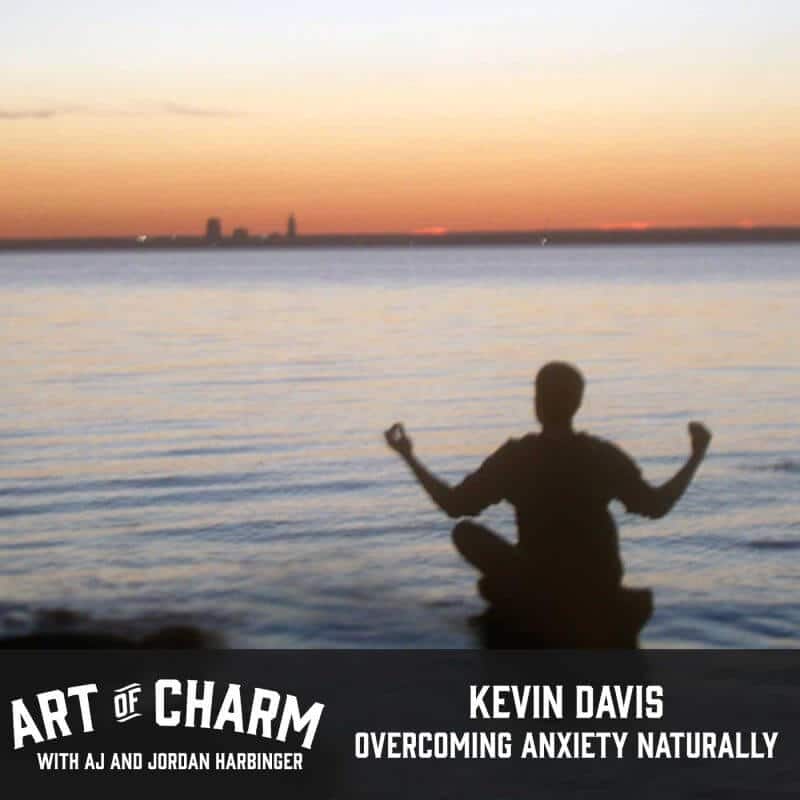Many high performers suffer from anxiety.
“The anxiety itself becomes an addiction.”-Kevin Davis
The Cheat Sheet:
- Do only combat veterans suffer from PTSD?
- What is brain zap?
- Why you don’t have to be a monk to meditate.
- Rest and relaxation are not lazy: how to change your mindset on this.
- True or false: it takes 20 minutes to get really focused after switching tasks?
- And so much more…
The stigma surrounding anxiety is slowly receding in American culture today, and that’s a good thing. PTSD and other anxiety disorders are incredibly common, and so is the unhealthy habit of masking or attempting to treat those disorders with medication which often does more harm than good.
Here to give us suggestions on how to recognize if we’re suffering from an anxiety issue and what to do about it is Kevin Davis. Kevin is an anxiety coach who runs a podcast called The Anxiety Coaches. He has grappled with anxiety personally and found solutions that didn’t require medication. He’ll tell us all about this and so much more on episode 364 of The Art of Charm.
More About This Show:
One day while driving down his usual road, Kevin had to swerve into the ditch to avoid an oncoming car. Everything happened so quickly he wasn’t able to stop from running head on into a pole. His car’s hood crumpled and he saw the engine explode into flames. Fortunately, he escaped and was okay.
But a few weeks later he started having severe physical symptoms while driving down that same road. His heart rate would rapidly increase to 200 BPM or more, which increased his panic. He worried he had done irreparable harm to his body by over-consuming caffeine, working out too hard, and steroids. Not once did he correlate his symptoms with post traumatic stress disorder (PTSD) from his frightening car accident, nor did anyone else in his life.
He eventually went to the doctor and was diagnosed with an anxiety disorder. His doctor wanted to give him medication, but when Kevin read the side effects, he wanted no part of it.
Instead, he researched all possible treatments for anxiety and started exploring on his own. He found a few things that worked — meditation being one of them. But it seemed like, as one treatment would kick in, his symptoms would show up in another form. He could treat his constricted feeling in his throat for a week or two only to have tingling in his hands show up the next week.
Then his mom Googled anxiety disorders and found a website run by anxiety coaches. These were men and women who had experienced anxiety themselves and had overcome it without drugs. They were now trained coaches with psychology backgrounds who were sharing their expertise with anxiety sufferers. Kevin found a coach and together they realized he had PTSD from his car accident.
That was his first step towards truly healing his anxiety. With a new understanding and the help of his coach, he was able to get a handle on his symptoms and treat their roots.
One of the tools he learned was meditation. According to Kevin, we don’t have to become monks to meditate and reap the benefits. By listening to a guided meditation for just 20 minutes a day, our brains will respond differently in just a few short weeks. Those 20 minutes will help our minds focus better, stay on track easier, stay calmer, and reduce our overall anxiety.
Another trick we discuss is not to multi-task. When we’ve got three different things we’re trying to do within the hour, it’s best to focus on one, knock it out, and move on to the next one. If we try to juggle all three at the same time, we won’t get as far and may not even finish any of the tasks.
When we’re focused on one task, we can hone in on it with laser focus; we actually get far less done when we’re juggling multiple tasks because it takes us up to 20 minutes to shift gears from one subject to another. So if you’re editing something and you want to switch to creating a new spreadsheet, it can take your brain up to 20 minutes before it’s really focused in on making that new spreadsheet. So focus in on one thing, get it done, and move on.
Kevin and I also talk about the need to recharge, why it’s important to set boundaries, and more on this episode. Grab the full download to hear Kevin shares his personal story, insights, and wise words on today’s episode. Thanks to Kevin for joining us and, as always, thank you for being here. We’ll see you next time.
THANKS, KEVIN DAVIS!
Resources from this episode:
You’ll also like:
- The Art of Charm Challenge (click here or text 38470 in the US)
- The Art of Charm Bootcamps
- Best of The Art of Charm Podcast
- The Art of Charm Toolbox
- The Art of Charm Toolbox for Women
On your phone? Click here to write us a well-deserved iTunes review and help us outrank the riffraff!
